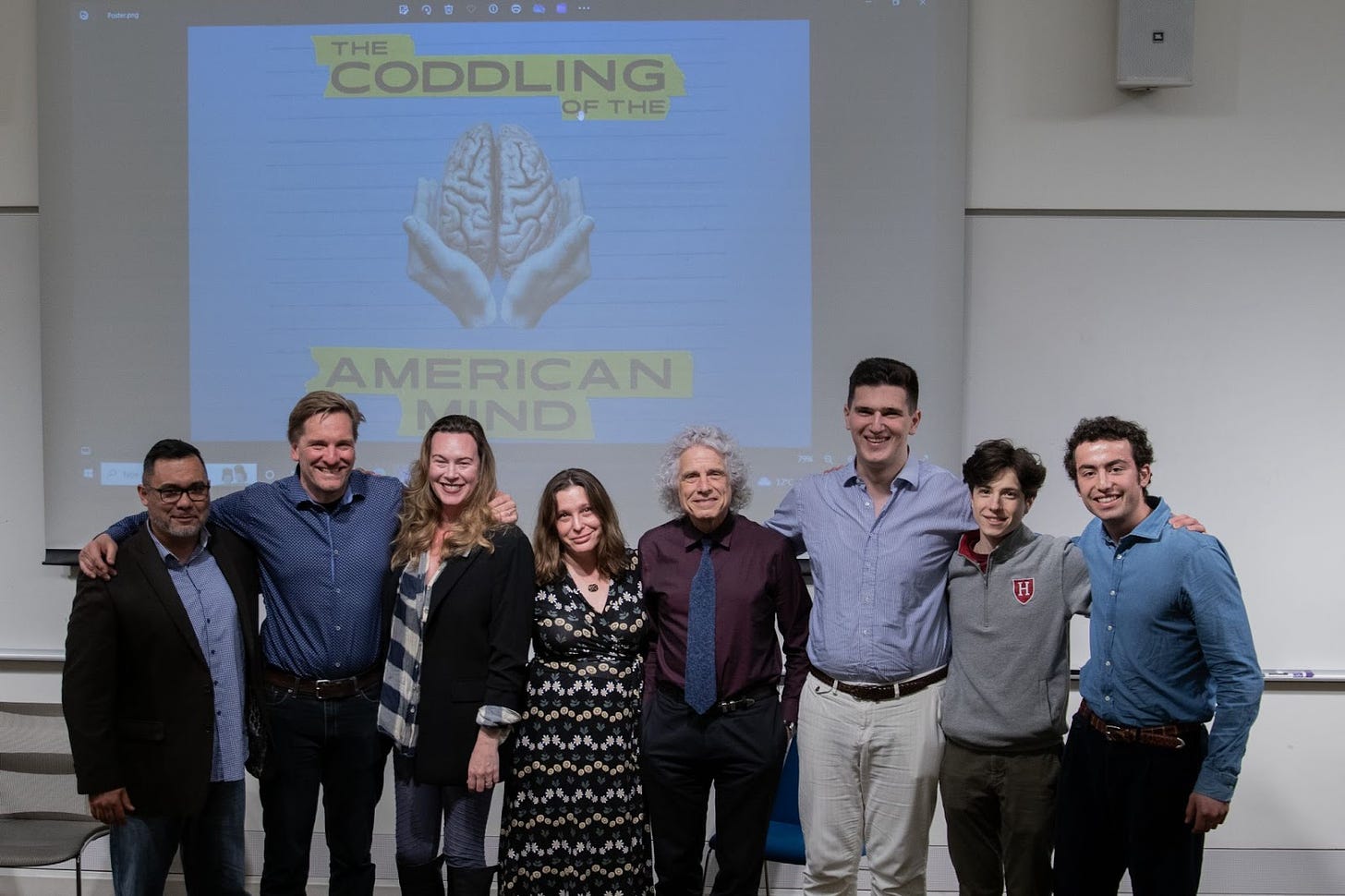What'll It Be, Harvard—Minority Advancement or DEI Dogma?
Ivies could create feeder schools for underserved black and Hispanic students

Dear Coddling Movie Community,
As you know, Courtney and I recently returned from an East Coast trip where The Coddling Movie screened at a variety of locations including Harvard, Cornell, and Princeton.
The film has also screened at UPenn, which means we’ve hit four of eight Ivy League campuses. (We were scheduled to screen at Columbia just before the campus erupted.)
The Ivy turmoil continued when Cornell’s president stepped down recently.
Our pal, Cornell’s Dr. , was all over that development, and he examined the groupthink that has gripped our nation’s most prestigious campuses.
In this essay, I dig a bit more into Ivy League groupthink and its consequences for one of the institution’s top concerns—minority advancement. I hope you enjoy it.
All the best,
Ted
Last summer the Supreme Court shot down racial preferences in college admissions, and since then universities have been looking for other ways to achieve their diversity goals.
Imagine if, during a DEI staff meeting at Harvard, someone piped up with this suggestion:
You know, if we want more black and brown students, why don’t we create some feeder high schools in poor neighborhoods? That way the kids would get a great education and we could admit them using the same standards we use for everyone else.
How do you think Harvard would respond?
Actually, we don’t have to imagine it. Someone at Harvard did make such a suggestion, and that someone is no slouch.
In fact, Roland Fryer is precisely the type of person the Eight Percenters tell us we should turn to in such matters.

The economist has amassed impressive credentials. At age 30, he became the youngest African American to be awarded tenure at Harvard. He’s received many prestigious awards including a MacArthur Fellowship and the John Bates Clark Medal (awarded to the best economist under age 40).
He also has a compelling personal story. He was raised by his grandmother, and endured a tough childhood that included plenty of racism. For instance, the parents of some of his white friends wouldn’t allow black people in their living rooms—in the 1980s!
Fryer even made his suggestion in the Eight Percenters’ favorite newspaper, The New York Times. In an op-ed, he pointed out that colleges regard the supply of qualified minority students as fixed. They rely on existing schools to teach students how to get up to speed for the expectations they’ll face in college:
[A]nd if those schools routinely fail minority students, well, that’s a problem with the precollege pipeline.
This argument has allowed elite colleges to sidestep responsibility for far too long. They could fix the problem if they truly wanted to. Elite colleges could operate a network of, say, 100 feeder middle and high schools — academies that are open to promising students who otherwise lack access to a high-quality secondary education, in cities where such children are common because of high poverty rates and underperforming public schools. These institutions would bring their students up to the sponsoring universities’ standards so that they are ready for elite schools when they graduate.
Educating lots of students wouldn’t be cheap. Fryer estimates that putting 50,000 students through four years of high school would cost $4 billion. Usually, a figure that large would kill the conversation, but c’mon, this is the Ivy League we’re talking about!
That $4 billion figure represents only about 2 percent of the Ivy’s $200 billion endowment (a figure that is projected to grow to $1 trillion by 2048). Fundraising could offset the cost, and Fryer promised to take a year off to lead the charge.
I hesitate to call any fundraising effort “easy,” but look at what Fryer would have to work with: The Ivies are fundraising machines that have direct access to many of the wealthiest people on the planet. And he’d be asking them to support Harvard-branded schools that would help minority kids get into the Ivies. Let donors slap their own names on plaques outside the schools, and watch the money tsunami swell.
According to Fryer, the time to act is now:
If we truly believe that a lack of opportunity is what holds black and Hispanic students back — if we actually believe that and don’t just say it to signal our virtue — we should be impatient about taking matters into our own hands.
If Fryer were delivering these words during a speech, that’s the moment we’d expect the audience to jump out of their seats cheering and fumbling for their checkbooks.
But Fryer’s proposal was met, not with cheers, but with silence.
During an interview with Russ Roberts of EconTalk, the two speculated that readers might have regarded Fryer’s proposal as satire, something I find hard to believe. Fryer is a serious scholar, writing on a serious topic, in a (mostly) serious publication. He insists his op-ed was no joke.
“I can tell you this,” he said. “It is not a piece of satire. It is a 'put your endowment where your mouth is' kind of piece.
RELATED
Harvard Screening Recap: “The Coddling” Movie Goes to Cambridge
Someone Tore Down Our “Coddling” Movie Posters — Cornell Screening Recap: Welcome to the modern university
Princeton Screening Recap (Columbia Screening Postponed)
Groupthink Versus Progress
A black Harvard scholar outlines how to achieve the university’s diversity goals, and he’s (apparently) ignored. How strange.
Harvard constantly asserts its commitment to diversity, but could it be that the university and its Ivy colleagues are even more committed to other ideals?



